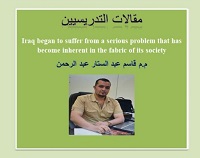|
Unemployment in Iraq: Causes and Solutions
2021-07-06

Unemployment in Iraq: Causes and Solutions
By Asst. Instructor Qasim AbdulSattar AbdulRahman Al-Ani
Iraq began to suffer from a serious problem that has become inherent in the fabric of its society, that is, the problem of unemployment, which ranges between 30-50%. Even the measures that were taken to treat it were nothing but a mirage in which the thirsty thought water. This problem goes beyond the ordinary levels to reach education, especially higher education. This situation opens the door for immigration. Many people decide to migrate outside the country. The globalization and the revolution in information technology which make the world looks like a united village encourage the youth to leave their original countries to look for work. The facilities, presented by European countries and the respect they offer to the person and the provision of opportunities for work and the simplicity of the business environment make the unemployed eager to emigrate. This immigration represents a great loss to the country if there is no adequate absorption and employment.
Due to the bad internal conditions and the dissatisfaction of many graduates with what is happening in the country, as they did not have an audible opinion or a tangible solution from the management and decision-makers, many of them were forced to think about traveling abroad. The majority are graduates of education, whether they are preparatory, bachelor’s, master’s or doctorate. This is what is called brain drain. It is a real loss for the country because of the amount of money that the government has spent to create such intellectuals to be learnt and a holder of a certificate. Then the government is easily waiving him and giving as a gift to Western countries without any return. Moreover, he/she will never contribute in building his/her own country that is in dire need.
The causes
The rentier economy is the main cause of unemployment in the country. This means that the economy in Iraq depends on oil as the only resource. This resource is characterized by many characteristics: the most important of which is the instability in relation to its prices for political, economic and natural reasons, and its short life due to its penetration or due to its low economic importance. In addition, oil is a general wealth that is not limited to the current generations. Therefore, social justice should be achieved between the current generations on the one hand, and between future generations on the other hand. Its negative impact on the environment cannot be hidden. This resource is not stable because it is a global commodity with the country's inability to control it in a manner consistent with the national economy. Rather, it is subject to external factors. Any change in this resource will move to the national economy in the absence of proper management of it, for example when there is a rise in oil prices, it will lead to higher revenues and then budget revenues. This is what drives an increase in expenditures and then an increase in demand for goods and services. This, in turn, causes many economic problems, such as a high exchange rate, inflation, a decrease in exports, an increase in imports, a deficit in the balance of payments and the general budget, a decrease in economic growth and a high level of unemployment, especially when a suitable environment is not available to receive this increase in demand.
Solutions
First: The field must be open and wide for private sector companies in a real way with its support. The private sector has a role in creating sufficient job opportunities. This requires an appropriate environment and support because in reality the private sector is still stumbling in its path due to the many procedures and obstacles. These obstacles limit its launch, such as infrastructure, financing, external competition, political chaos and distrust.
Second: Determining the percentage of the contribution of the upper limit of oil to the Iraqi economy in order to stimulate and revitalize other economic sectors such as agriculture, industry, tourism, construction and others. In doing so, it will not tyrannical and controlling factor. For example, parliament can determine the percentage of oil contribution to public revenues that should not exceed 50%. If these sectors activate, it will greatly reduce unemployment.
Third: Paying attention to education and its outputs should be appropriate to the needs of the labor market. The interest in education in Iraq in terms of administrative and professional skills, language, scientific competence and others, all work to increase the desire of producers, investors and employers from the increasing demand for these individuals, whether from within or from outside the country and from the public sector or the private sector. This in turn reduces the size of unemployment.
|